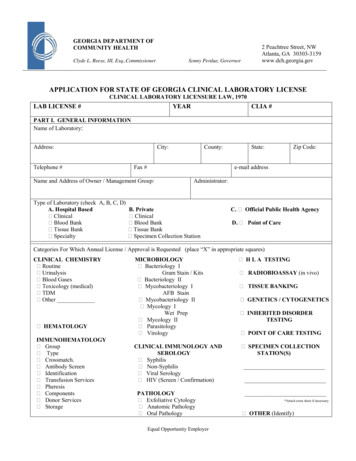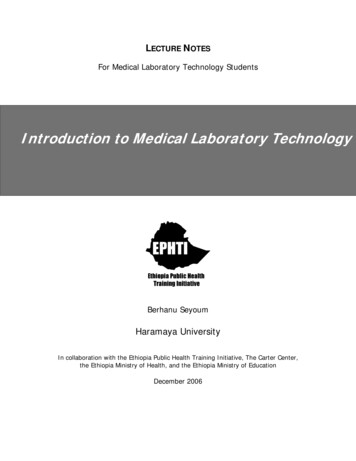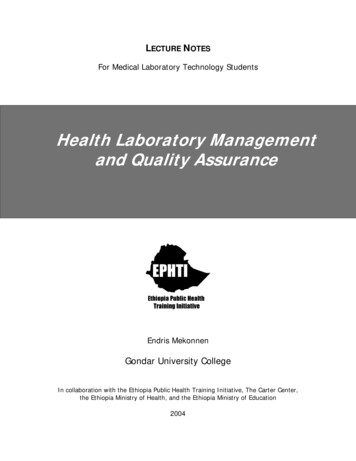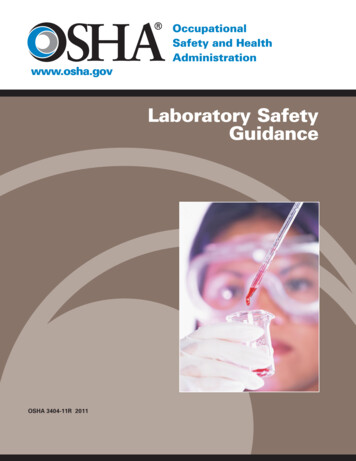
Transcription
The Management of Laboratory TrainingseriesTRAININGIBMS1
Institute of Biomedical ScienceThe Management of Laboratory TrainingAs the UK professional body for biomedical science the Institute has establishedthe following policy on training for those responsible for the managementand delivery of laboratory services. The Institute believes that training doesnot cease at the point of qualification or the confirmation of competence, butcontinues through all career levels. A strong training culture benefits not justthe individual but also the employer and the service user.The UK health departments have put patient care and safety at the heart ofhealthcare provision. It is the responsibility of the respective providers andall those involved in the delivery of service and care to deliver safe and highquality patient care. It is the responsibility of the professions themselves toestablish those standards of best practice relative to their own service.What this policy doesThis policy is a professional benchmark of best practice for the management anddelivery of laboratory training.What this policy does notThis policy does not mandate on staff numbers or grades or times required toundertake the role. These are dependent on local services and circumstances.Role nomenclature and definitionsTraining manager/co-ordinator – the individual with overarching responsibilityfor training in a multi-section single department, or over a multi-departmentlaboratory service (this may cover more than one site).Training officer – the individual(s) responsible for the delivery of training within asection or department.Where a laboratory is a satellite laboratory of a network service there must bea named training officer IF receiving individuals for training and verification ofcompetencies.Training mentor – an experienced professional colleague who assists the‘mentee’ in developing specific skills and knowledge that will enhance theirprofessional and personal growth.Training responsibility requirementsIndividuals with responsibility for training are required to have the appropriateknowledge and skill to deliver a training and education programme in accordancewith guidelines from the relevant professional and registration bodies,commensurate with the needs of the service and professional development ofstaff. Training managers/co-ordinators and training officers must have specificnamed responsibilities irrespective of whether this is a full time role or anelement within a wider remit. Whilst all biomedical scientists should be involvedin training as part of their professional responsibility, it should be recognisedthat some individuals may have a specific joint role between a higher educationinstitution and the employer or may act as mentors within an education andtraining programme.The role and responsibilities of the Training Manager/CoordinatorThe Institute recommends the appointment of a training manager/co-ordinatorwith overall responsibility across all laboratory departments for the oversightand planning the training needs of all non-medical personnel, from supportstaff to senior scientists. The Training Co-ordinator may in some instances bethe laboratory manager, but it is essential that whoever undertakes this roleis of sufficient seniority to direct training across all disciplines. This role formsan integral part of the overall laboratory management team and, within thisstructure, is responsible for overseeing the implementation, development andco-ordination of training processes and procurement projects within pathology.It is recommended that a training co-ordinator should be an appropriatelyregistered Fellow of the Institute (FIBMS) and have a minimum of five years postregistration experience in an Institute approved training laboratory. It is stronglyrecommended that the training manager/co-ordinator holds a recognisedtraining qualification such as the Institute’s Certificate of Expert Practice inTraining.The post of training co-ordinator is a position with comparable responsibilityto that of quality manager and should be recognised as such. The role requiresknowledge of the different levels of qualifications, training and the optionstherein. The breadth of responsibilities of a training manager/co-ordinator isdependent upon the needs of the individual service provider and the trainingactivities undertaken in the laboratory which may include scientific, technicaland clerical staff. The objective of the training co-ordinator is to ensure there is atraining policy that covers all staff, which enables mandatory, departmental andindividual training objectives to be met.The training co-ordinator is responsible for the co-ordination of training officers,who in turn are the focus for delivering the training strategy and respectivetraining programmes.The training manager/co-ordinator is responsible for the development of anoverarching training policy that addresses relevant professional standards andguidelines.2IBMSTRAININGTRAININGIBMS3
In laboratories providing a service to the NHS it is the responsibility of thetraining co-ordinator to be aware of the requirements for the fulfilment of HCPCregistration training for biomedical scientists and to ensure that the departmenthas the capacity to train, whether delivered through a dedicated post or throughthe acceptance of undergraduate placement students. The training co-ordinatorhas the authority to determine and prioritise training needs taking in to accountthe skills requirement of the department, the human and financial resourcesavailable to deliver training and the developmental needs of the individualsconcerned. The Institute’s Expert and Advanced diplomas The Institute’s requirements for training laboratory approvalIn service providers that do not have a training manager/co-ordinator it is theresponsibility of the overall departmental manager to ensure the co-ordinationof training through the individual laboratory training officers to unsure uniformityof approach and prioritisation of training issues within the overall context oflaboratory management.A mentor is not the same as a trainer: mentoring is “relational,” while training is“functional.”Dependent on the scope of the training co-ordinators responsibility, the roleis usually supported by discipline specific departmental training officers withresponsibility for the delivery of training.[Please note: In adherence with NHS Cervical Screening Programme (NHSCSP)guidelines, laboratories delivering a cervical cytology screening service mustappoint a dedicated training officer with appropriate cytology screeningqualifications, in addition to the Training Co-ordinator].Role and responsibilities of a Training OfficerThe training officer is the individual who delivers the training or who delegatesspecific aspects of training to named individuals. It is recommended that trainingofficers should be appropriately registered Members of the Institute (MIBMS)with a minimum of three years post-registration experience in an Instituteapproved training laboratory. The Institute strongly recommends that trainingofficers hold a recognised training qualification such as the Institute’s Certificateof Expert Practice in Training.Training officers support the training manager/co-ordinator in the developmentof a training policy and the accompanying training programme and areresponsible for the delivery of training. It is essential that as a minimumdepartmental training officers are familiar with: The Institute’s support staff qualifications (the Certificates of AchievementParts I and II) The Institute’s Registration Training Portfolio The HCPC Standards of Proficiency for Biomedical Scientists The Institute’s Specialist Portfolios and their training requirements The Institute’s Higher Specialist Diploma4IBMSTRAININGThe training officer must maintain all procedures and records that relate toindividual training.The role and responsibilities of a mentorThe role of mentor is not a formal laboratory role, rather it is a named individualwho is there to support and encourage their mentee. A mentor is usually a moreexperienced staff member (but not necessarily at a senior level) who is willingand able to pass on the benefit of their experience. The role is not simply to ‘tell’the mentee what to do, the role of the mentor is to listen and be supportive,provide guidance and pass on knowledge and experience. It is recommendedthat mentors and prospective mentors will have had some training or instructionthat enables them to understand the purpose and significance of this role. Allstaff undertaking an Institute expert or advanced qualification would be expectedto have a named mentor (this may be a medical pathologist if appropriate) forguidance and support.Where staff are undergoing a period of cross discipline training (e.g. as part ofa multi-discipline blood sciences service) a mentor is recommended to supportthe training officer in the training and familiarisation process for already qualifiedstaff.Training governance arrangementsManagement structures vary according to local preference and need. However,it is expected that the training manager/co-ordinator (if not also the laboratorymanager) will be responsible directly to the laboratory manager. It remainsthe responsibility of the laboratory manager to agree and implement therecommendations of the training manager/co-ordinator.In organisations where there is an individual training manager/co-ordinatoracross all laboratory disciplines it is the responsibility of this individual toensure the uniformity of understanding and implementation of the laboratorytraining policy. To this end the training co-ordinator is advised to form a trainingcommittee, if one does not already exist, that holds minuted meetings, andwhich reports in to the formal departmental committee structure. The trainingcommittee must include individuals with training responsibility at a departmentallevel. Its purpose is to address common training issues and to provide aneffective mechanism for the dissemination of training information within thelaboratory and also between the laboratory and laboratory service users.TRAININGIBMS5
It is essential that the role of the laboratory training co-ordinator is recognisedoutside of the laboratory context and that provision exists for laboratoryrepresentation by the training co-ordinator on appropriate external committees.It is essential that the training committee, through the training co-ordinator,ensures co-operation with professional colleagues, that the profile of training inthe laboratory is maintained and appropriate to the requirements of the service.GlossaryCompetency programme - the in house assessment of competence against skillsrequired for a specific service elementDepartment – a specific area within a larger laboratory serviceLaboratory - the primary service unit that may comprise a number of separatelaboratories with their own manager and training individualsSupport staff – Staff who are not regulated by statute and who are under thesupervisory responsibility of qualified and regulated staffTraining policy - The training policy is a generic departmental document thatdetails the strategic approach to education, training and development of all nonmedical staff.Training programme – this is specific to each individual qualification anddescribes the detailed structured approach to the delivery of training andassessment of competence for each stage and the schedule for any rotationaltraining programme through other disciplines, where applicable. It must includethe programme of seminars and tutorials, proposed secondments (if appropriate)and an indication of time and duration within each section of the departmentTraining placement – the period of time spent by an individual as a mandatorypart of an accredited degree course whereby practical experience is gained in anapproved training laboratory.Training secondment – the period of time spent by an individual in a differentlocation from that where they are routinely employed in order to gain experiencethat they would not routinely encounter and which may be necessary or aparticular qualification.6IBMSTRAININGTRAININGIBMS7
Copyright and disclaimerThis document and its contentsincluding the IBMS logo are theproperty and trademarks of theInstitute of Biomedical Science.The copyright on this materialis owned by the IBMS (unlessotherwise explicitly stated). Thisdocument or no part of it may becopied, reproduced, republished,downloaded or transmitted inany way, other than for yourown personal, non-commercialuse. Prior written permissionmust be obtained from theIBMS, using the contact detailsbelow, for any other use of thismaterial. All rights are reserved.copyright Institute ofBiomedical Science 2015About IBMS publicationsThe Institute publishes a widerange of professional andscientific publications andguidance.Further information anddownloadable publications:www.ibms.org/publicationsAbout this policy documentTitle:Produced by:Version:Active date:Review date:Contact:Institute of Biomedical Science Policy on the Managementof Laboratory TrainingEducation and Professional Standards CommitteeVersion 2January 2014July 2017Education DepartmentT: 44 (0)20 7713 0214E: education@ibms.orgBranding and design by CLIP Creative & PR: www.theclipgroup.com8
6 IBMS TRAINING TRAINING IBMS 7 It is essential that the role of the laboratory training co-ordinator is recognised outside of the laboratory context and that provision exists for laboratory representation by the training co-ordinator on appropriate external committees. It is essential that the training committee, through the training co-ordinator,










